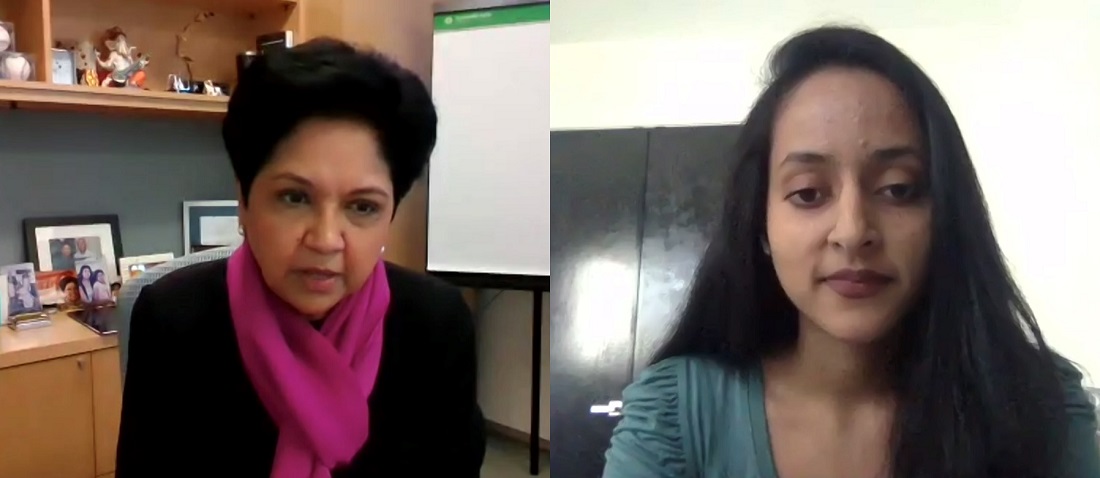
Indra Nooyi, Param Iyer ask young change-makers to take the lead at Safe Water Network event.
Innovative change drivers want aspiring young change-makers to dare to dream and seize the moment without worrying about making mistakes to tackle challenges faced in the water and climate change nexus.
Over 500 young global change leaders from 30 countries connected virtually at Safe Water Network’s second virtual youth series event, “Water and Climate Change: Risk and Resilience”, to celebrate 29th World Water Day on March 22.
They heard inspiring speakers like Indra Nooyi, Former Chairman and CEO of PepsiCo, and Param Iyer, Global Lead of Strategic Initiatives at The World Bank’s Water Practice, spotlight their innovative and solutions-oriented work in this field.
Contemplating the value of water at the behest of the United Nations, Kurt Soderlund, CEO of Safe Water Network, noted the “enormity of the challenge from the perspective of the two billion people who every day struggle to access safe water.”
“This struggle needlessly compromises the health and livelihoods of too many communities all over the world,” he said asking the participants to consider the many complexities of the water- climate challenge.
“Like most of today’s great challenges, while the need is obvious, solutions are riddled with complexity,” Soderlund said. “The challenges are worthy of persistence, commitment and sustained engagement.”
Noting that for a long time people had a lot of difficulty articulating the link between water and climate change, Nooyi, said she has “always believed that a lot of the real innovation, the disruptive ideas, the breakthroughs don’t come from looking at issues in a silo.”
“They come from exploring the white spaces between the silos,” she said, “and that’s how we need to think in a systems way as an independent society living in an interconnected world focused on collaboratively finding solutions.”
“Now once we find the solutions, it’s also important that people hear about them,” Nooyi said citing the example of a great new technique devised to conserve water at one of PepsiCo’s plants in Pune in India that perhaps no one had heard of in a similar plant in another geography.
Safe Water Network, she noted had for 15 years been optimizing the solutions that work and are now sharing that knowledge with the broader sector to have others replicate what they have learned.
“There should be no territoriality for these ideas,” Nooyi said as “the magnitude of the combined challenge is much too great and the need for solutions is just urgent.”
“There is a collective responsibility towards climate change including corporate action,” she said. “It requires leadership in government. It requires community action and most importantly individual action.”
Asking the younger generation to lead the action “with your innovative thinking your can-do attitude with your appetite for risk,” Nooyi encouraged them “to take charge and own the future of the planet.”
In a conversation with Venky Raghavendra, SVP, Safe Water Network, Iyer spoke of the challenges he faced as a secretary in government of India leading the Indian Prime Minister Narendra Modi’s ‘Swachh Bharat’ (Clean India) mission.
Modi, he noted outlined his vision on August, 15, 2014 in his first independence day speech, understanding the importance of sustainable development at a time when over a billion people in the world were practicing open defecation and having unsafe sanitation.
With more than 550 million people defecating in the open in India because they had no access to safe sanitation, Modi decided to fix this problem in a short period of five years.
To translate his big vision, Modi was very keen that it becomes a “jan andolan’ or the people’s movement, Iyer said, and youth really had to play a critical role in that.
As open defecation was a “cultural practice” in India, he said, “a lot of mental models needed to be changed and it had to be done at scale” by using from mass media to Bollywood and cricketing stars like Amitabh Bachchan, Akshay Kumar and Sachin Tendulkar.
“We were lucky that prime minister modi was our communicator in chief”, Iyear said, “but on the ground, you needed to have people who understood what triggers behavior change.”
“We had to get into the science of that and in different places whether it was school kids and school girls you know acting as ambassadors and motivating their teachers, parents and the entire community” to keep their villages clean.
Asked for his ‘mantra’ for the young people involved in the Safe Water Network, Iyer said, “ I think the first is you need to dare to dream.
“The second point is you need to seize the moment,” he said. “when an opportunity presents itself don’t let it go and never be afraid to take risks particularly when you’re young. Don’t worry about making mistakes, get out there.”
Mohit Chauhan, noted Bollywood singer, songwriter and composer described water and climate as “some of the biggest challenges that we face today.”
Coming as he did from the Himalayan mountain state of Himachal Pradesh, he said “the cause of environment is really close to me, to my heart.”
“Growing up with rivers and beautiful forests around around me when I was in school, in college, I sensed the importance of preserving nature, our forests, our trees,” Chauhan said. “That’s how we’re gonna have water in abundance for future generations.”



